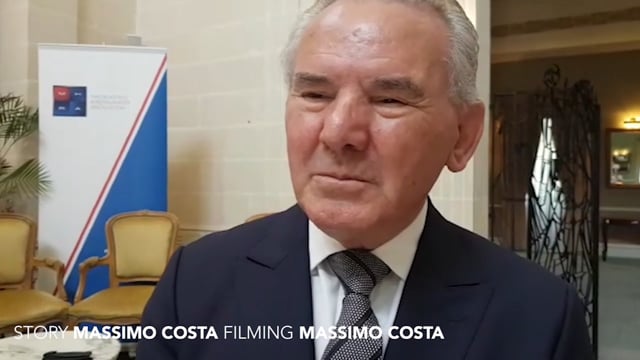[WATCH] Hotels register decline in guest nights as tourists take up private accommodation
Hotel guest nights have declined by 5.5% in the first three months of 2019 as the tourism sector faces a situation of oversupply, a quarterly tourism study finds


A decline in hotel occupancy levels has been registered for the first time in a number of years, a hotel performance survey shows.
The survey, carried out by BOV and Deloitte for the first three months of 2019, indicates that while there has been an increase in the number of tourist arrivals, occupancy levels in hotels went down by 5.5%.
The five and four-star hotel segment only achieved average room rates as a result.
Tourist arrivals were up 2.8% and overall guest nights in general increased by 4.2% during the first three months of this year. The increases were less pronounced than those registered in previous years and expenditure rose at a slower pace.
But the upward movement in guest nights was not reflected in the results of hotels, indicating that they were mostly taken up by the private accommodation sector.
“Most of this change is coming from the evident change in mix in the type of tourist – the reason for visiting Malta,” Deloitte financial adviser Raphael Aloisio said.
The number of tourists staying in hotels remained at par with the previous year, but the number of guest nights spent in hotels decreased by 5.5%.
“From a hotel perspective, the results were not on the same trends which we got used to for a number of years, where graphs just went up,” Aloisio said.

He said that after periods of “very above average levels of growth”, it was inevitable that there would be a dip.
“The art of what we’re looking at now is how to counteract the threat to a situation which still remains one of strength,” Aloisio said.
He highlighted that the private accommodation sector – now led by booking.com and Airbnb services – always existed, but the effect this is having on hotel occupancy was now starting to become more noticeable, especially in view of the thousands of unlicensed beds.
“There is an inescapable trend of hotel accommodation and private accommodation. This has always existed, but the tilt is now becoming more evident, and people are looking at it with deeper concern,” he added.
The shift in accommodation preferences has had a negative impact on the hotel sector’s profitability, with both five and four-star hotels reporting a decline in gross operating profits, the survey shows.
However, Aloisio said that Airbnb growth is challenging 4-star hotels more than the other sectors.
“Airbnb is increasing at about 1,000 units per year at a price bracket which is close to the 4-star sector. So, this pressure is definitely linked to the reality shown in the results,” he noted.
Increase in accommodation supply at root of problem
Aloisio said that since 2012 there has been a surge in the rate of permits for hotel projects.
The rate of new permits for hotels reached 119 in 2017, a massive increase from the 2012 rate of 17, he noted.
“This is a strong indicator of what’s happening when it comes to the supply and points to what is the real contributory factor to the problem today,” he said, stressing that the rate of increase in accommodation supply was at the root of the problem.
“What’s hurting us more is the pace of supply more than the challenges of demand… The reality is that if supply continues to increase exponentially based on the very strong tourist arrival results, the economic consequence will be that the overall results will go down,” Aloisio said.
MHRA president urges caution on new hotel projects
MHRA president Tony Zahra underlined the importance of planning and of having a sustainable hotel industry.

He said that the accommodation sector in Malta had enjoyed five successful years, but now too many hotels had opened, and there was a problem of excess supply.
“In 2008, there was a financial meltdown which wasn’t Malta’s fault, and everyone stopped travelling. All of a sudden hotel rates went down radically, and it took five years before the rates of 2008 were reached again in 2013. The industry bled badly, but we managed to get through that period and we grew,” he said.
Zahra said the sector had passed through five good years as a result of everybody’s hard work but was now facing a situation of oversupply.
“As often happens, as soon as something is having a good stretch, new hotels started opening… There is a lot of supply which is entering the market, and this is going to be far in excess of the demand,” he said.
Zahra urged anyone in the process of making a decision to start a hotel project to think twice. “Have a second thought and check if there is the demand for it,” he said.
New accommodation services on booking.com will need MTA licence to sign up
Tourism Minister Konrad Mizzi acknowledged that private accommodation was a reality from both a supply and customer demand perspective.

He said that the private accommodation sector had grown significantly, and many tourists and business travellers were now opting for this instead of hotels for their stay in Malta.
Mizzi said that in light of this the Malta Tourism Authority had reached an agreement with booking.com whereby anyone offering a new accommodation service – such as a self-service flat – on the website would need to input an MTA license number to be allowed to sign-up.
Moreover, the MTA is also in discussions with review website TripAdvisor to implement a similar system, he said.
“This will help regularise the situation and ensure there is a level playing field,” Mizzi said.

.png)




.jpg)
















